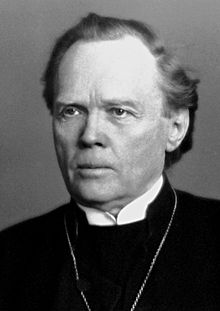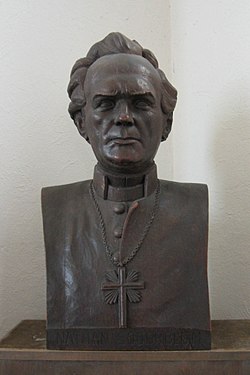Nathan Söderblom
The Most Reverend Nathan Söderblom | |
|---|---|
| Archbishop of Uppsala Primate of Sweden | |
 | |
| Church | Church of Sweden |
| Diocese | Uppsala |
| Elected | 20 May 1914 |
| In office | 1914–1931 |
| Predecessor | Johan August Ekman |
| Successor | Erling Eidem |
| Orders | |
| Ordination | 1893 (priest) |
| Consecration | 8 November 1914 by Gottfrid Billing |
| Personal details | |
| Born | Lars Olof Jonathan Söderblom 15 January 1866 |
| Died | 12 July 1931 (aged 65) Uppsala, Sweden |
| Nationality | Swedish |
| Denomination | Church of Sweden |
| Parents | Jonas Söderblom and Nikolina Sophie Blûme |
| Spouse | Anna Söderblom (born as Forsell) (1870–1955) |
| Children | 12 |
| Alma mater | Uppsala University |
Ordination history of Nathan Söderblom | |||||||||||||||||
|---|---|---|---|---|---|---|---|---|---|---|---|---|---|---|---|---|---|
| |||||||||||||||||

Lars Olof Jonathan Söderblom (Swedish pronunciation: [ˈnɑ̌ːtan ˈsø̌ːdɛrblʊm]; 15 January 1866 – 12 July 1931) was a Swedish bishop. He was the Church of Sweden Archbishop of Uppsala from 1914 to 1931,[1] and recipient of the 1930 Nobel Peace Prize. He is commemorated in the Calendar of Saints of the Lutheran Church on 12 July.[2]
Life and career
[edit]Söderblom was born in the village of Trönö in Söderhamn Municipality, Gävleborg County. His father was a parish priest. He enrolled at Uppsala University in 1883. Although not initially convinced what he wanted to study, he eventually decided to follow in his father's footsteps. On returning from a journey to the United States, he was ordained as a priest in 1893. During the years 1892 and 1893, he was first vice president and then president of the Uppsala Student Union.[2]
From 1894 to 1901, he had a ministry position at the Swedish Embassy in Paris, where his congregation included both Alfred Nobel (1833–1896) and August Strindberg (1849–1912). In 1897, he officiated at the memorial service for Nobel. From 1901 to 1914, Söderblom held a chair in the School of Theology at Uppsala University and from 1912 to 1914 was also a professor of religious studies at Leipzig University. In 1914, he was elected as Archbishop of Uppsala, the head of the Lutheran church in Sweden. During the First World War, he called on all Christian leaders to work for peace and justice while working to alleviate the conditions of prisoners of war and refugees.[3]
He believed that church unity had the specific purpose of presenting the gospel to the world and that the messages of Jesus were relevant to social life. His leadership of the Christian "Life and Work" movement in the 1920s has led him to be recognised as one of the principal founders of the ecumenical movement. He had begun the movement toward intercommunion between the Church of Sweden and the Church of England and was a close associate of the English ecumenist George Bell (1883–1958), Dean of Canterbury, Bishop of Chichester. He was instrumental in chairing the World Conference of Life and Work in Stockholm, in 1925. In 1930 he was awarded the Nobel Peace Prize.[2][4]
Selected works
[edit]- Den enskilde och kyrkan : föredrag (1909)
- Helighet och kultur (1913)
- Gudstrons uppkomst (1914)
- 9 Works by Nathan Söderblom at The Documentation of Chinese Christianity program, Hong Kong Baptist University Library
See also
[edit]References
[edit]- ^ "Religious Organizations" (in Swedish). World Statesmen. Retrieved 22 December 2014.
- ^ a b c "Nathan Söderblom". The Nobel Foundation. Retrieved July 1, 2020.
- ^ "Nathan Söderblom". The Giffordlectures. Retrieved July 1, 2020.
- ^ "Nathan Söderblom 1930". Nobel Peace Center. Retrieved July 1, 2020.
Other sources
[edit]- Andrae, Tor J.E. (1931) Nathan Söderblom (Uppsala University)
- Curtis, Charles J. (1967) Söderblom: Ecumenical Pioneer (Minneapolis, Augsburg Publishing House)
- Jonson, Jonas (2016) Nathan Söderblom: Called to Serve (Grand Rapids: Eerdmans Publishing Company) ISBN 0802873081
- Katz, Peter (1949) Nathan Söderblom: A Prophet of Christian Unity (London, James Clarke)
- Sundkler, Beng (1968) Nathan Söderblom: His Life and Work (Lutterworth Press) ISBN 9780718815738
Further reading
[edit]- Dietz Lange, Nathan Söderblom und seine Zeit, Göttingen 2011
- Klas Hansson, Nathan Söderblom's ecumenical cope. A visualization of a theological and ecumenical concept. Studia Theologica – Nordic Journal of Theology, vol 66, issue 1, 2012
External links
[edit]- Nathan Söderblom on Nobelprize.org
- The Content of Christian Faith, a reflection by Nathan Söderblom
- Free scores by Nathan Söderblom in the Choral Public Domain Library (ChoralWiki)
- Newspaper clippings about Nathan Söderblom in the 20th Century Press Archives of the ZBW
- 1866 births
- 1931 deaths
- People from Söderhamn Municipality
- Uppsala University alumni
- Academic staff of Leipzig University
- Lutheran archbishops of Uppsala
- 20th-century Lutheran archbishops
- Swedish historians of religion
- Members of the Swedish Academy
- Nobel Peace Prize laureates
- Swedish Nobel laureates
- People celebrated in the Lutheran liturgical calendar
- Burials at Uppsala Cathedral
- People in Christian ecumenism
- Lutheran saints


